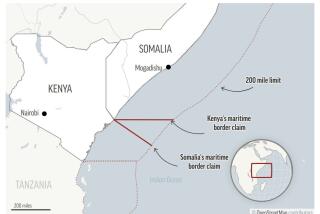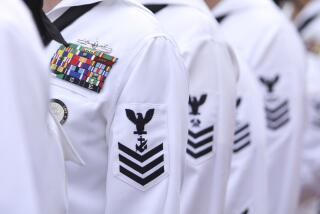Navy Walks a Fine Line in Recruiting SEALs While Protecting Military Tactics
- Share via
Navy SEALs, who call themselves the “Silent Professionals,” traditionally avoid being identified or photographed by the media.
Brave men under extraordinary circumstances, they seem to be afraid of only one thing: a camera.
But, as branches of the armed services jockey for the ever-diminishing pool of recruits and funds, SEALs and other traditionally low-profile military branches are inching toward the spotlight.
The customarily reticent submariners, for instance, gave their blessings to the movie “The Hunt for Red October” last year. The SEALs, too, recently had a movie made about them.
And as Class 172 went through Hell Week--the sixth week of a 25-week training program--last fall, The Times was allowed unprecedented access to the exercises and the men involved. In recent weeks, with interest in SEALs spurred by the Persian Gulf War, officials have received many requests--that they will try to honor--from networks wanting to film SEALs.
“We have got to walk a balance--we want to advertise the program but we don’t want to give away tactics,” said Capt. Thomas N. Lawson, chief of staff for the Naval Special Warfare Command. “We need qualified, capable people saying, ‘I want to be one of those guys.’ ”
In recent years, special operation forces, such as the SEALs, have received more funding and more attention. The SEAL community, which includes 1,560 enlisted men and 471 officers, has increased in size by 72% from five years ago. In 1981, the special operation forces received $441 million; of that, SEALs received $93 million. In 1990, $2.8 billion was allocated to special operation forces and SEALs got $333 million.
“SEALS are coming of age,” said Cmdr. Bob Pritchard, the SEALs’ first public affairs officer, who started work in October. “They understand part of the recruiting effort is based on the public understanding what they do and who they are.”
Though SEALS acknowledge the need to woo the best candidates, they chafe at dropping their cloak-and-dagger habits. The preference for stealth is heightened by the war in the Persian Gulf.
A Washington Times article last month said that Navy SEALs and the Army’s Delta Force were prepared to carry out a clandestine strike on the Sea Island oil complex to prevent an oil spill like the one that occurred. Throughout the military’s special operations community, that article--rigorously denounced by the Pentagon--caused chilling ripples felt even at low levels of training.
For this story, SEALs and members of Class 172 were warned not to speak about current operations in the Persian Gulf. And some SEALs were very reluctant to talk about anything at all.
“To be perfectly frank, I don’t think you should be here. I don’t think you should name names, and I certainly don’t think you should be taking pictures,” one SEAL told a reporter.
SEALS are reluctant to be named or photographed for security reasons, including fear of retribution or revenge wreaked upon family members, said Lawson.
“If an individual’s face or name shows up in a newspaper, he is free game. And there are a lot of crazies in the world,” said Lawson, who acknowledged that there have been no cases of SEALS killed or injured as a result of publicity.
When one reporter recently attended a final-phase training session, it was evident that the SEALs had not struck a balance between their zeal for secrecy and quest for recognition. One enrollee was ordered to drop and do 50 push-ups when he talked to a reporter. The instructor who issued the order ran to the reporter and, trying to read the notebook, he asked: “What did he tell you?”
When The Times covered Hell Week last fall, Navy officials asked that instructors eligible to go on missions remain unnamed. The same request was made in following Class 172 during two days of its final training. Navy officials selected exercises that they believed were reflective of the entire 25-week training. And officials asked that the details of certain combat techniques not be released.
There was also social pressure for class members to keep quiet. Would-be SEALS included in The Times’ previous stories said they had been razzed for speaking. Rich Cleveland, who had tried twice before to get through Hell Week, had been nicknamed Grand Poohbah. That name was changed to “Hollywood” after Cleveland appeared in The Times stories.
More to Read
Sign up for Essential California
The most important California stories and recommendations in your inbox every morning.
You may occasionally receive promotional content from the Los Angeles Times.













